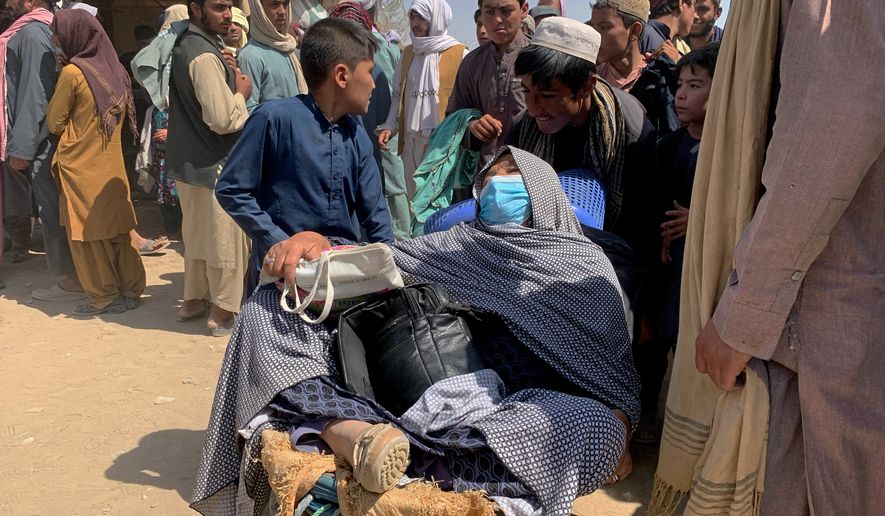The diplomatic crisis facing President Biden after the Taliban seized Afghanistan includes tough calls about humanitarian aid to the country, which ranks as one of the poorest in the world.
On the one hand, the administration doesn’t want to cut taxpayer-funded checks to the Taliban, which is known for trampling human rights, enforcing Shariah law with brutality and fostering al Qaeda terrorists. On the other hand, withholding aid could worsen a full-scale humanitarian crisis.
As the largest donor to Afghanistan, the U.S. has provided more than $266 million this year through early June, according to the U.S. Agency for International Development, which is responsible for administering foreign aid.
That is a little more than half of the $500 million the U.S. has allocated to spend this year on humanitarian relief in Afghanistan. It is not clear whether the remainder of the money will be distributed after the collapse of the Afghan government.
President Biden has pledged to continue aid to Afghanistan.
“We will continue to support the Afghan people. We will lead with our diplomacy, our international influence and humanitarian aid,” he said.
The White House is still debating what that aid will entail. State Department officials privately acknowledged that distributing aid under the Taliban regime poses significant challenges.
The Taliban already have seized 500 tons of food and medicine at the Afghanistan border, the U.N. World Food Program said this week.
When the Taliban ruled Afghanistan before their ouster in 2001, they refused to allow female aid staff, chose who received aid and demanded payments, or “taxation,” for access to citizens. Some of the funds were siphoned off to enrich Taliban leaders.
Those demands likely will be reinstated, although the Taliban have not announced their aid policies.
Afghanistan was already locked into multiple humanitarian crises before the Taliban took control. A severe drought, surging COVID-19 cases and mass displacement because of violence besieged the nation.
About half of all Afghan citizens required humanitarian assistance in 2021, a sixfold increase from 2017, the United Nations said.
The delicate situation poses a dilemma for countries that provide aid to Afghanistan.
Save the Children, a humanitarian organization that helps children in nations ravaged by war or natural disasters, said it was “extremely concerned” about a severe hunger crisis in drought-plagued Afghanistan.
“Even before the Taliban advancement, Afghanistan had the second-highest number of people facing emergency hunger levels in the world. Half of all children under 5 were expected to suffer from acute malnutrition this year and require specialized treatment to survive,” the group said in a statement.
Some European countries raced to suspend development aid after the Taliban seized power.
Germany announced that it was halting all aid to Afghanistan, which would have totaled $300 million. None of that money had been disbursed, but Afghanistan is the largest recipient of German development aid.
Finland and Sweden also said they were suspending aid and offered no timetable for restoring it.
Swedish Prime Minister Stefan Lofven said in a social media post that his country needs to reconsider how to best deploy aid in Afghanistan.
“We are not abandoning the Afghan people,” he wrote. “But Sweden will need to redirect some of the aid to Afghanistan following the Taliban seizing power.”
The European Union, which had pledged $1.4 billion in development assistance through 2024, announced that it would suspend aid payments.
NATO announced that “there is no Afghan government” to support.
The United Kingdom bucked its European allies and announced that it would increase aid by as much as 10%.
British Foreign Secretary Dominic Raab said in a radio interview that Afghans were in desperate need of assistance, but he stressed that the government was working to ensure that the funds wouldn’t go through the Taliban.
Although the U.S. has not officially halted aid, it has taken steps to deprive the Taliban of cash.
The Biden administration this week froze billions of dollars in Afghan government reserves held in U.S. bank accounts. That blocked the Taliban from accessing the funds.
Under pressure from the Biden administration and Republicans in Congress, the International Monetary Fund took similar action Thursday by blocking a $460 million loan scheduled for the country.
The IMF in June released a $370 million loan to Afghanistan to help its economy during the COVID-19 pandemic.
Administration officials are likely pressuring the World Bank to cut off funds to Afghanistan. A spokesperson for the Treasury Department did not respond to a request for comment, but the U.S. took similar steps to halt aid to Venezuela.
The frozen assets, however, are only a drop in the bucket compared with international support for Afghanistan.
About 80% of Afghanistan’s budget is funded by other countries, including the U.S., John F. Sopko, the special inspector general for Afghanistan reconstruction, told Reuters in March.
Without that aid, he said, the country would collapse into chaos.
“Even the Taliban recognizes they really need foreign support,” he told the outlet. “Without it, the government falls.”
The U.S. provides most of the funds, but President Trump began to decrease the amount. Afghanistan received $4.9 billion in 2019, accounting for 10% of all U.S. assistance. In 2015, USAID gave Afghanistan nearly $10 billion.
Andrew Natsios, who served as administrator for USAID under President George W. Bush, said he expects the U.S. to ultimately halt aid to Afghanistan. He said if the U.S. continues to send aid, then it should do so through a nonprofit, nongovernmental organization to ensure the funds reach Afghanistan’s most vulnerable.
“I doubt the U.S. government will provide any development assistance to Afghanistan given the high likelihood the Taliban will be committing atrocities across the country; their promises otherwise are not creditable,” he said. “We should provide humanitarian assistance given the forced displacement going on but only through NGOs and U.N. agencies.”
• Jeff Mordock can be reached at jmordock@washingtontimes.com.




Please read our comment policy before commenting.